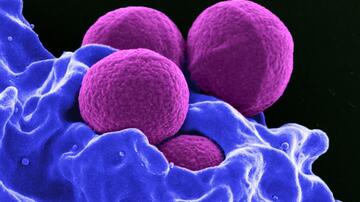Antibiotic-resistant bacterial pathogens (ARBPs)
Antibiotic-resistant bacterial pathogens (ARBPs) are a global problem. ARBPs are becoming increasingly prevalent and cause severe morbidity and mortality in industrial and developing countries alike. It is foreseeable that current, antibiotic-based regimes to treat bacterial infections will become inapplicable in the coming decades. It is inevitable to act now and to develop effective strategies to prevent infections before they occur. Simon Heilbronner’s working group focuses on the opportunistic pathogen Staphylococcus aureus, which causes a wide array of invasive diseases characterized by high fatality rates. Additionally, antibiotic-resistant lineages (especially MRSA) are a global threat. Importantly, one third of the human population carries S. aureus asymptomatically within the nasal cavity, and this colonization represents a major risk factor for humans to develop infection.
The overreaching aim of Simon Heilbronner's research group is to develop novel infection-prevention strategies. For this, the researchers investigate the pathogen in the context of the human host during infection as well as in the context of the human microbiota during colonization.
The working group uses a wide array of approaches and models including Next Generation Sequencing (NGS)-based metagenome analysis, genetic and biochemical characterization of virulence factors in vitro as well as in vivo during infection in animal models. Further, we use nasal colonization models in SPF and gnotobiotic animals to investigate the impact of the human nasal microbiota on S. aureus colonization. Gnotobionts are animals in which no or only certain known strains of microorganisms are present. They are often so-called "germ-free" animals.



